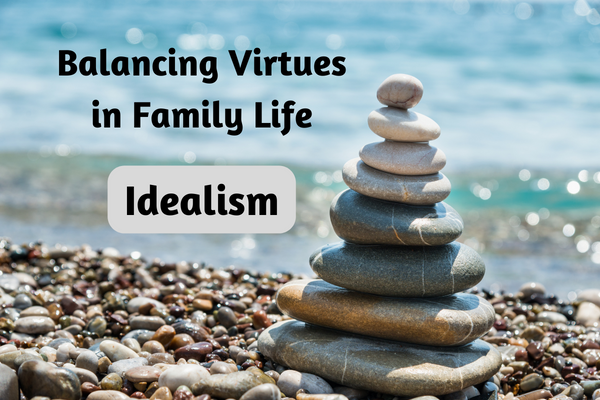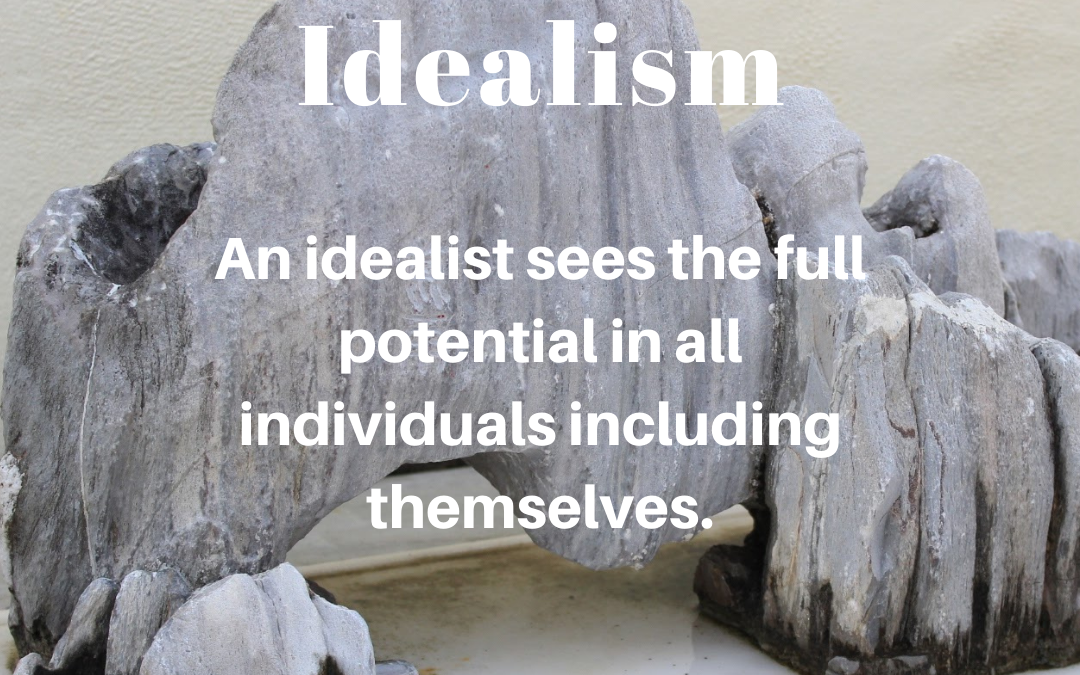
Balancing Idealism in Family Life
Finding the Right Balance for Children's Growth

Idealism is having a vision of what is possible and wanting to make a difference.
What happens, though, if idealism is overdeveloped or underdeveloped?
As with all virtues that we have, when they get out of balance, the virtue does not serve us or others well. Let’s delve into the concept of idealism and explore how it can be overdeveloped or underdeveloped, as well as which virtues can help maintain its balance.
Overdeveloped Idealism:
- Naivety: When idealism is taken to extremes, it can lead to naivety. Overly idealistic individuals may be so focused on their vision of what is possible that they ignore practical considerations, potential obstacles, or the complexities of the real world. They might trust everyone blindly, which can result in disappointment or exploitation.
- Impatience: Overdeveloped idealism can lead to impatience and frustration. Idealists with unrealistic expectations may become easily discouraged when they don’t see immediate progress or when others don’t share their enthusiasm for change.
- Inflexibility: Extreme idealism can make someone inflexible, unwilling to compromise, and resistant to considering alternative viewpoints. They may become dogmatic in their beliefs, which can hinder collaboration and problem-solving.
Underdeveloped Idealism:
- Cynicism: On the other end of the spectrum, an underdeveloped idealism can manifest as cynicism. People with underdeveloped idealism may be disillusioned by past failures or setbacks, leading them to believe meaningful change is impossible. They may become apathetic and disengaged.
- Apathy: Underdeveloped idealism can result in apathy or indifference toward making a positive difference. Those who lack idealism may not see the point in striving for change and may become complacent with the status quo.
- Lack of Purpose: Individuals with underdeveloped idealism may struggle to find a sense of purpose or meaning in their lives. They may not have a vision of what is possible or a strong desire to contribute to something greater than themselves.
Balancing Virtues:
To keep the virtue of idealism in balance, several other virtues can be particularly helpful:
- Practicality: Balancing idealism with practicality helps individuals make realistic plans and take pragmatic steps toward their goals. It ensures that the idealistic vision is grounded in achievable actions.
- Resilience: Idealists should cultivate resilience to cope with setbacks and challenges. Believing in the power of change doesn’t mean it will always be easy, and resilience helps persevere in adversity.
- Open-mindedness: Embracing diverse perspectives and being open to feedback can counterbalance the inflexibility that can come with extreme idealism. It encourages collaboration and the consideration of different approaches to achieving meaningful change.
- Patience: Understanding that meaningful change often takes time can counteract impatience. Patience is crucial for maintaining motivation and preventing discouragement during the journey towards realizing one’s ideals.
- Realism: Striking a balance between idealism and realism ensures that the vision of what is possible aligns with the practical limitations of the world. Realism helps prevent the disappointment that can come from setting unattainable goal.
Idealism is a powerful virtue when held in balance, but it can be problematic when taken to extremes in either direction. Embracing practicality, resilience, open-mindedness, patience, and realism can help individuals channel their idealism effectively and make a positive difference in the world while staying grounded in the reality of the human experience.
Applying these concepts in family life can create a positive and nurturing environment. Let’s explore how these principles can be applied in a balanced way in the family:
Overdeveloped Idealism in a Family:
- Unrealistic Expectations: Parents with overdeveloped idealism may have very high expectations of their children, expecting them to excel in all areas without considering each child’s unique abilities and limitations. This can lead to undue pressure and stress on the children.
- Lack of Boundaries: Overly idealistic parents might envision a perfect family life and be unwilling to establish appropriate boundaries. This could result in an environment lacking structure and discipline.
- Difficulty Handling Disappointment: Children may feel they can’t live up to their parents’ lofty expectations in an environment of overdeveloped idealism. This can lead to a fear of disappointing their parents and negatively impact their self-esteem.
Underdeveloped Idealism in a Family with Children:
- Apathy Towards Growth: Parents with underdeveloped idealism may become complacent and lack the motivation to provide their children with a stimulating and nurturing environment. They may not set goals or encourage their children to strive for personal growth.
- Resistance to Change: An underdeveloped idealism can result in resistance to change or improvement within the family. Parents may resist trying new approaches or making necessary adjustments, leading to stagnation.
- Lack of Support: Children in such families may not be encouraged and guided to pursue their passions or interests. Without a sense of purpose or vision for their future, children may struggle to develop their own idealism.
Balancing Idealism with Resilience, Open-Mindedness, and Patience:
- Resilience: Teaching children resilience in the face of challenges and setbacks is crucial. It helps them understand that it’s okay to make mistakes and encounter obstacles to achieving their goals. Parents can model resilience by acknowledging their mistakes and demonstrating how to bounce back from them.
- Open-Mindedness: Fostering open-mindedness within the family encourages healthy communication and collaboration. Parents should be open to their children’s ideas and viewpoints, allowing them to express themselves and explore their interests without judgment.
- Patience: Patience is key in a family setting. Parents can balance their idealism by recognizing that their children are on their unique journeys of growth and development. It’s important to allow children the time to discover their passions and interests and not rush their progress.
- Realistic Expectations: Encouraging children to set realistic, achievable goals while still nurturing their dreams is essential. Parents should help their children break down their aspirations into manageable steps and celebrate their achievements along the way.
- Guidance and Support: Parents should provide guidance and support to help their children pursue their passions and interests. This involves helping them explore different opportunities and providing resources and encouragement.
By balancing idealism and practicality, parents can empower their children to pursue their dreams while equipping them with the resilience and skills to navigate life’s challenges.
I invite you to sign up for our newsletter. It is a great way to get the Virtue of the Month and tips on relationships, parenting, and self-care. In addition, you’ll be the first to know about upcoming classes for successful families.
To sign up, visit the “Newsletter” section here on the website. Enter your email address, and you’ll receive our newsletter in your inbox on Wednesdays. I appreciate your interest in bringing out the best in your children and yourself. We look forward to keeping you informed through our newsletter!

